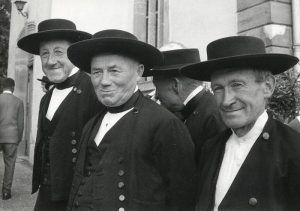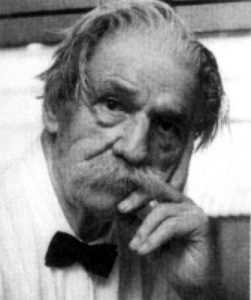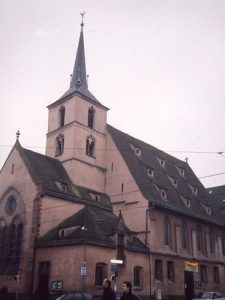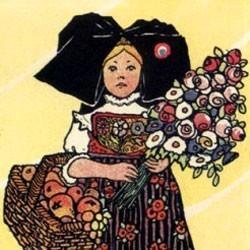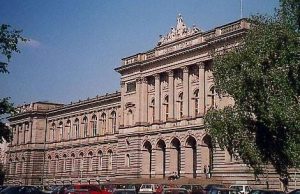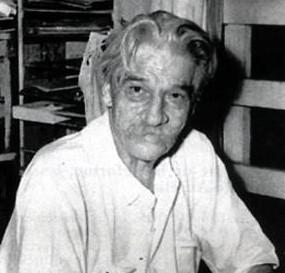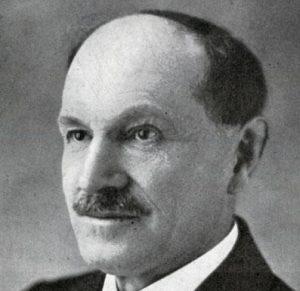The 26th German Land
The 26th Land was directly administered by the emperor and the ministry of justice who imposed their administration on all French structures. It was the era of the « dictatorship paragraph » which muzzled the press and the appointment of special commissioners to run the major cities. For example, the head of police became the mayor of Strasburg.
The people of Alsace were divided, some wished to stay and had to become German citizens, others wished to leave and had to relinquish their past and abandon their belongings. More than 50,000 people in Alsace, mostly executives, professionals and intellectuals left for France or Switzerland, and many politicians and mayors resigned to avoid swearing allegiance to the emperor.
Confronted by the persistent demand for autonomy, the law of 31 May 1911 set up a federal system, similar to that of other German states. Three delegates were nominated to the Bundesrat in Berlin, two local houses of representatives were created, but the emperor kept the right to veto laws. Most of the power remained in the hands of German civil servants, called « Vieux-Allemands » (« Old-Germans »).
Legislative work initiated by Bismarck was extensive : tax reforms, the adaptation of the German Civil Code, modernisation of social laws and of professional organisations, the reform of the university, especially that of Strasburg. In 1909 a law was proposed that would make obligatory the teaching of French in localities which « deem it necessary ».
Ecclesiastical organisation
The Concordat organised the Alsace-Lorraine churches according to the organic articles dated 8 April 1802, and updated in 1852-1853 by several ministerial decrees. The most important of these was the law-decree of 26 March 1852 reorganising Protestant worship. It distinguished between the recognised forms of worship subsidised by the state and municipality, and those which were not ; only Lutheran and Reformed protestant worship were recognised.
In 1871 the concordat legislation binding the state and the Reformed church as well as the Church of the Augsburg Confession was confirmed by the German authorities. The memorandum concerning the organisation stated that the state and the churches had the same aims, that the state considered it was its sacred duty to protect the churches and to guarantee their independence and autonomy ; but as for the churches, they had to teach obedience to civil authorities, and no encroachment of ecclesiastical power on civil power would be tolerated. The annexation of Alsace-Lorraine led to the reorganisation of ecclesiastical institutions.
For the Lutherans of Alsace, (the Church of the Augsburg Confession of Alsace-Lorraine, or ECAAL) the higher authorities centralised in Strasburg could continue to work and remain independent from the German churches ; the French Lutherans, cut off from the Directoire and Consistory which had stayed in Strasburg, had to reorganise. Thus they adopted a synodal system in accordance with the law of
1 August 1879, and the decree of 12 March 1880. Conversely, the Reformed in Alsace were cut off from the central council of the French Reformed churches, but as its role was purely administrative, its absence was easily accepted. The Reformed from Moselle were also separated from the Reformed in Meurthe et Moselle, but the former were numerous enough in Metz to create their own consistory. Apart from structural changes and adjustment of a few clauses to the German situation, the essential was preserved.
With regard to the educational system, the Falloux law (15 March 1850) promoting religious educational institutions was developed in 1881 under the German regime, emphasising the confessional character of the primary school.
Political life
Political life was organised along three main lines, namely :
- The liberal party, comprising mostly higher middle class Reformed and Jewish urban citizens, was mostly pro-French : the motto « We shall maintain » of the Moselle industrialists is still famous. Beside these prominent citizens, often anti-clerical, existed a strong tendency in favour of autonomy, predominantly Lutheran and rural, often pietist or “orthodox”, often well regarded by the German authorities.
- The central party or « Zentrum » comprised almost 40% of the population, mostly Catholics who voted according to their denomination, were opposed to the « Kulturkampf » and to Prussian liberalism.
- The left-wing social-democratic party influenced by the social work of the German pastor Naumann, was in favour of Germanising Alsace, and its score got better with each election.
All the parties published quality opinion papers which thrived. In the last 1912 elections, with 26% protestant population, each party won about a third of the votes.
The aphorism “French Catholics, German Protestants” is well known, but in fact situations are more complex and flexible. But on the whole, it should be said that most Protestants rallied to the regime, except for leaders of the economy and « liberals » who continued to speak French. As for the Catholics, generally hostile to Germany, the French anti-clerical policy made some of them choose the German side.
Social, intellectual and religious life
Social and intellectual activities were marked by a decrease in piety, but by an increase in social work, such as education oriented deaconry, deaconesses founding retirement homes and hospitals for the handicapped. Youth organisations were very active, as well as urban missions to fight alcoholism and prostitution.
With regard to intellectual activities, the renowned faculty of Protestant theology in Strasburg became even more famous as a result of Albert Schweitzer’s strong personality. He was « privat-dozent » from 1902 to 1912, and the publication of L’histoire de la recherché sur la vie de Jésus (The history of the research on the life of Jesus), as well as his writings about J.S.Bach made him famous.
The times were also marked by the revival of church music. For 15 years, A. Schweitzer played the organ at the church of Saint-Nicolas in Strasbourg, and the choir of the church of Saint-Guillaume, conducted by E. Munch, gained notoriety, as well as that of the Temple Neuf in Mulhouse.
Alsace during World War I
These were particularly difficult times. 250,000 men from Alsace were drafted into the German army and sent to the Russian front. All public freedom was suppressed. Civilians were considered with suspicion, arrested and imprisoned. But almost 18,000 men still risked fighting on the French side. German citizens, they had to change their names and they often enrolled in the French foreign legion because if the Germans found them they were considered as deserters and shot.
In October 1918, when the imperial regime collapsed, Germany tried to give Alsace independence, but nothing changed. After a few weeks of revolutionary unrest, the Versailles Treaty reintegrated Alsace into France.

